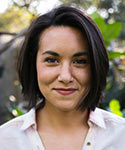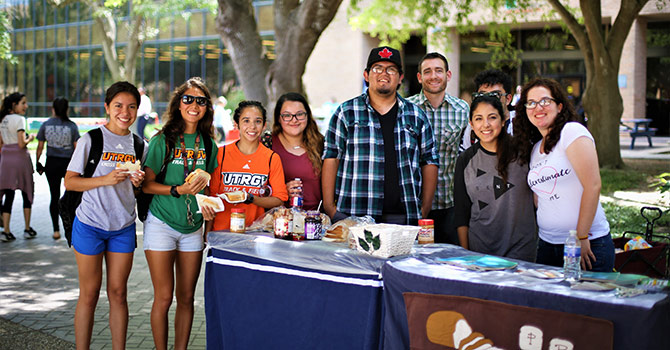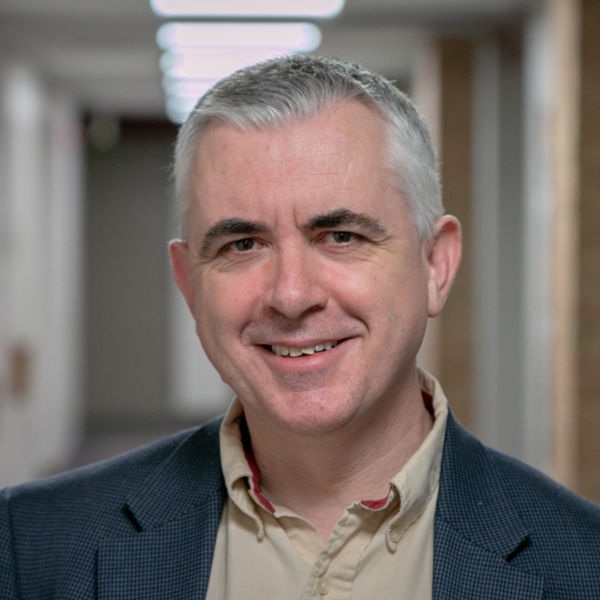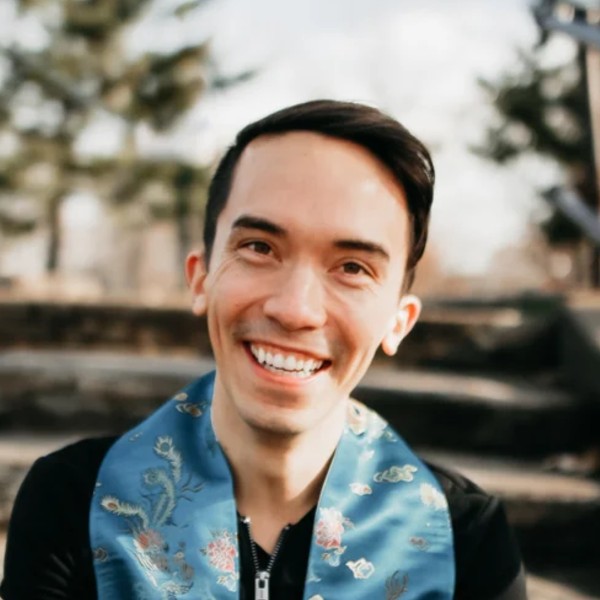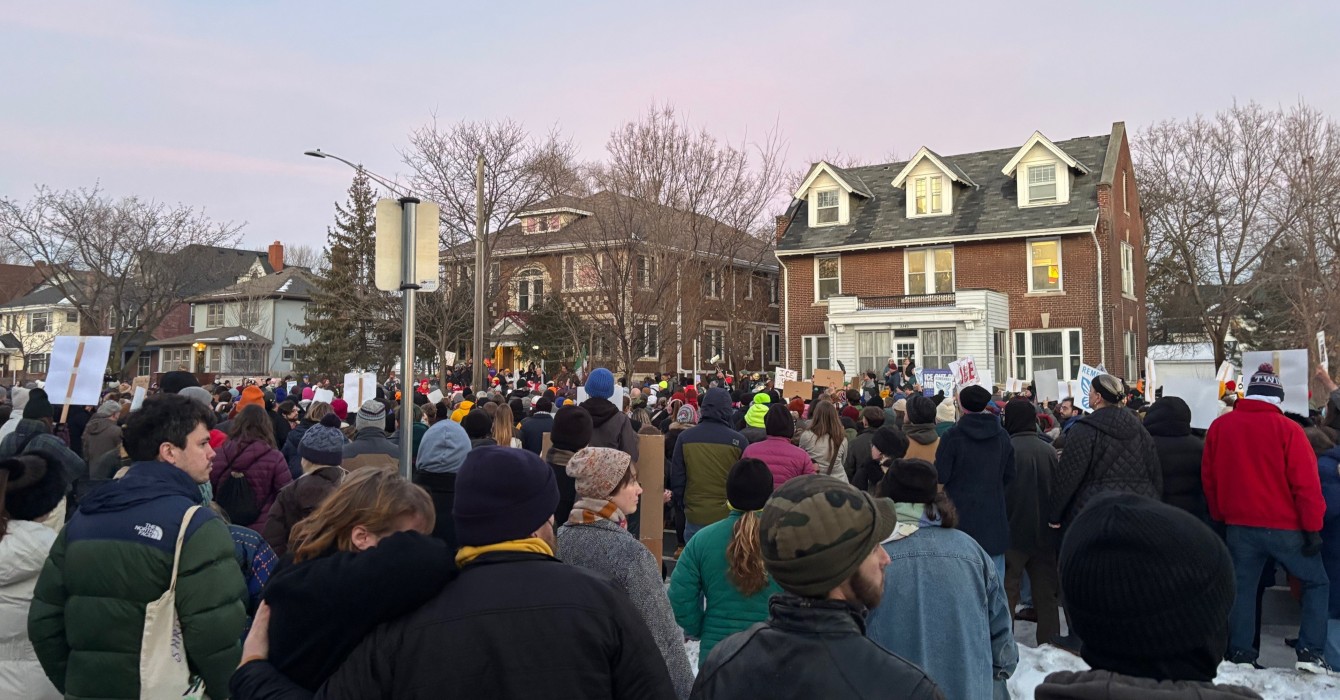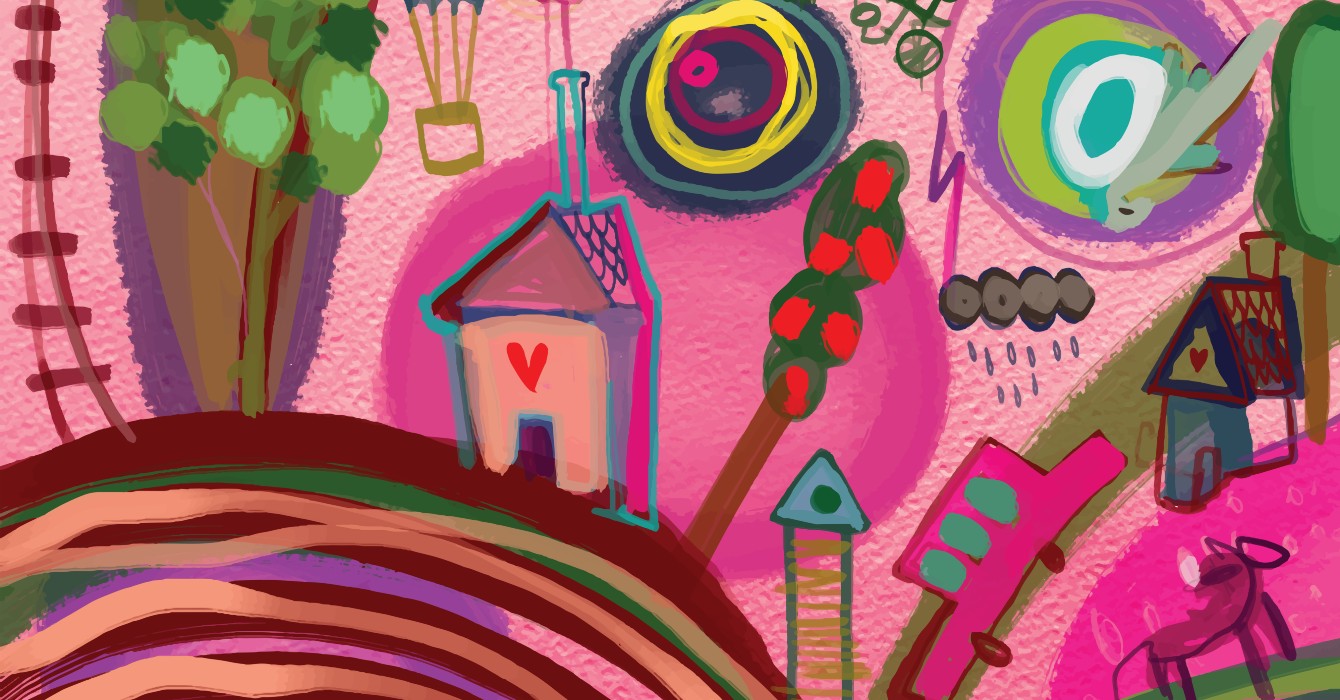Editor’s note: Elizabeth Le’anani Coffee is connected with the Baptist Student Ministry through her work with the Baptist General Convention of Texas. She received a grant as a participant in Leadership Education’s Foundations of Christian Leadership and used it to launch the social entrepreneurship accelerator program for BSM students. The deli received its first investment as a result of this program’s first pitch event.
There is an eerie feeling around most of the University of Texas Rio Grande Valley (UTRGV) campus these days. There are no students in crosswalks, few cars in parking lots and only scattered lights on in the buildings.
But on the campus’s northwest corner, there is a bustle of activity.
A line of cars snakes through a parking lot, bringing people eager to receive the meals and boxes of fresh produce being distributed by the Baptist Student Ministry.
Student ministry volunteers are strategically placed to organize the operation: one greets, one facilitates ordering and explains the social distancing protocols, one delivers food to a table outside, one sanitizes the containers before placing them in bags, one holds a sign that says “BSM Loves You” -- and one prays.
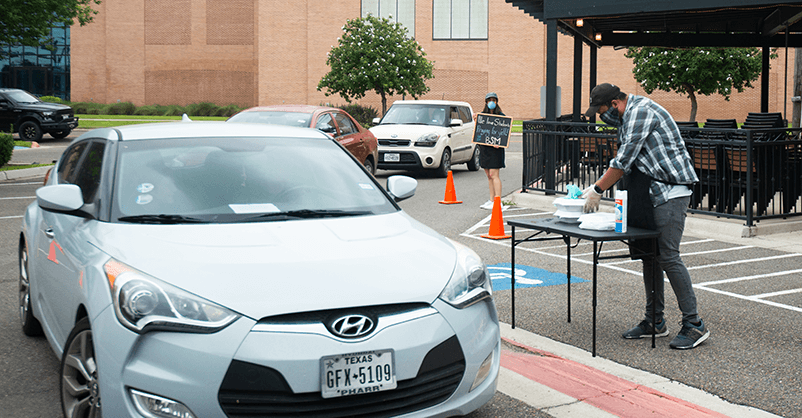
The Baptist students opened the Global Blends pay-as-you-can deli in September 2019. They knew then that they were being innovative. What they did not know was that their innovation would become necessary.
Today, amid a pandemic, with a church and university partnership and a newly incorporated drive-thru and delivery service, the deli is feeding hundreds of students weekly. Many of them were facing food insecurity before the pandemic; the current economic downturn has made the situation even worse.
Who is experiencing food insecurity in your community? Who is addressing this challenge? What might collaborating with other organizations to change the situation look like?
Robert Rueda, the BSM director, sees this as an opportunity not only to serve the community but also to challenge churches to do more than offer online versions of previous ministries. He wants them to reimagine ministry.
“My hope is that faith leaders would be inspired to find fresh ways of ministering to their communities -- thinking beyond the walls of their church and crossing through doors being opened by society,” Rueda said.
“This pandemic should transform us. If we go back to business as usual, we will miss an incredible opportunity. The hope is that the struggle, trial and shifting of our lives makes us stronger as a community of faith -- that we come out as salt of the earth.”
The deli supports itself with the income from patrons’ paying what they are able, the efforts of dedicated BSM volunteers, and the leadership of Gabriela Izaguirre, the campus missionary intern who manages the deli.
“Having this job means a lot to me, because I have people in my life who have shown me love through food,” Izaguirre said. “I was the kind of student who we seek to serve at one point. I had to stretch $30 or $40 a month for food and gas. And now it’s a blessing to be in this role.”

‘When faith and entrepreneurship come together’
The BSM first launched a student-run food truck with a pay-as-you-can revenue model in 2018, after going through a social entrepreneurship accelerator program funded by an Innovation Grant from Leadership Education at Duke Divinity.
What does “proof of concept” look like in your ministry setting?
It started off small with boba tea, coffee drinks and baked goods. After this proof of concept, Rueda and a group of BSM students decided to explore growing their food truck into a brick-and-mortar location. They now hope to expand to the other UTRGV campuses.
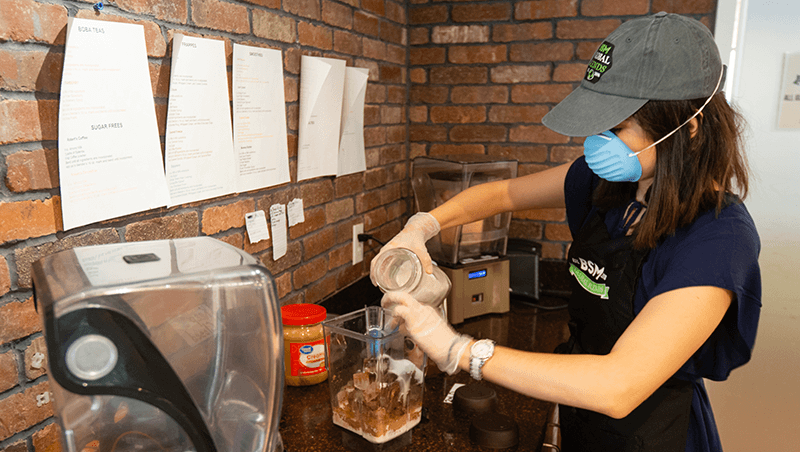
“There is something powerful when faith and entrepreneurship come together,” Rueda said. “Most of our students aren’t going to be ministers. Ministry for them looks like the everyday, and I want to equip them for that.”
Rueda had been eyeing and praying over the commercial building adjacent to the BSM property for years. The building had housed several failed restaurants and coffee shops. But he saw an opportunity to partner with an expanding local congregation, BT Church, that was looking for a space for Sunday morning worship closer to campus.
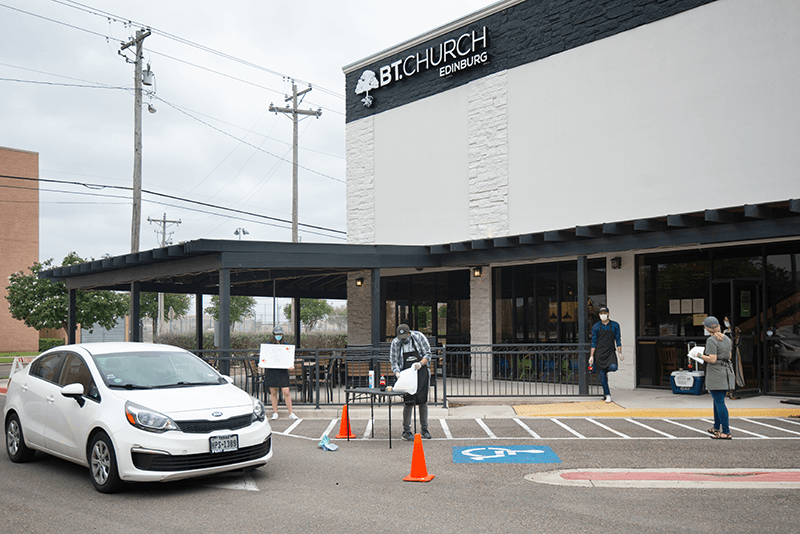
“When Robert shared about the realities around food scarcity right here in our backyard, it was surprising,” said Nick Maddox, the associate pastor at BT Church.
What ideas can you try on a small scale and then expand if they meet goals? Who else in the community might you invite and empower to lead such efforts?
“So many students having to decide on whether to use their money for gas or for lunch meant something to us,” he said. “The ministry of Jesus looked like feeding people, and that opened an opportunity for people to know him. We want to do that.”
Vivian Lopez, a junior engineering technology major, said the deli isn’t just providing physical sustenance in this isolating season.
“Being able to go through the drive-thru is so encouraging,” Lopez said. “I know someone is praying for me even if they don’t know my name.”

The church charges nothing for the BSM’s use of the commercial space during the week, and the BSM charges nothing for the church’s use of its auditorium on Sundays.
As a way of providing access to good and healthy food to their UTRGV community regardless of financial need, the deli started with congregational partnerships to provide necessary resources.
However, patrons who are able have paid far more than the traditional cost of a grilled panini or a hazelnut mocha, knowing that some who come behind them will not be able to pay anything. The BSM staff remember one student handing over $100 for a sandwich.
“I am so encouraged by the generosity of donors and students,” Rueda said. “But the reality is that the need for access to healthy food continues and even grows in our community.”

The Rio Grande Valley is the region of Texas along the northern bank of the Rio Grande River located along the state’s southernmost tip. The poverty rate of this region is twice the national average, and household income is $25,000 below the national median. The five counties in the valley have the highest poverty rates in the state.
What is your “ark”? What are you building that is designed with the needs of the community in mind? Who are the other organizations that share a concern for the community and might collaborate with you on experiments?
For these reasons, it has been a challenge for Rueda to find support for the deli and other entrepreneurial endeavors of the BSM.
“I have felt like I have been asked to build an ark and people don’t know what I’m doing,” Rueda said. “They have told me I’m crazy and that what we are doing is not ministry. I have had to keep in mind that this is God’s work. So even if people can’t see it, we welcome the fear and take a risk together.”
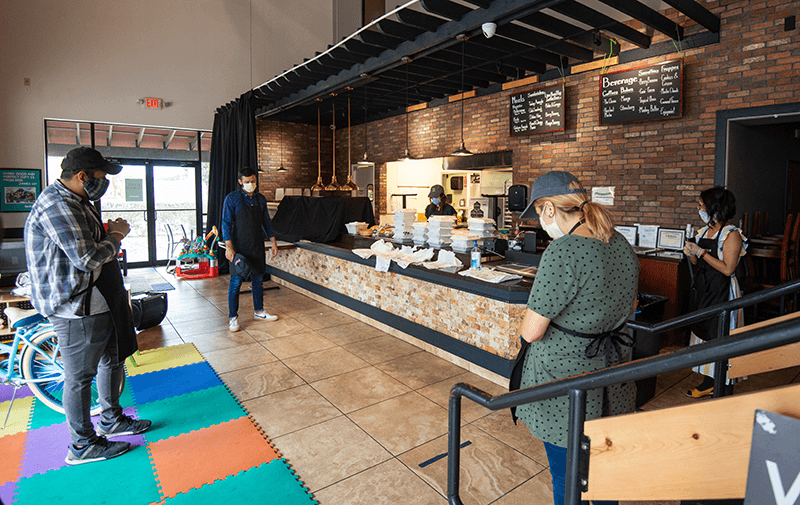
Food insecurity on campus
As the deli gained traction, it also gained attention.
The university took notice of the Global Blends deli after conducting research to identify the rate of food insecurity in the student population. It found that 44.2% of students were food insecure.
Qualitative interviews with students also revealed that there were not many affordable and nutritious options on campus.
And the stigma associated with economic hardship made it difficult for students to feel comfortable using services like the campus food pantry.
This information prompted Jayshree Bhat, UTRGV’s assistant vice president of professional education and workforce development, to see what others were doing to address the need.
“I started with what was already in the community to solve this and then worked to connect the dots for the university from there,” Bhat said.
She easily saw an opportunity to partner with the deli and use university resources to expand the work.
Before spring break, Bhat and Rueda were in conversations about next steps: hiring a chef specializing in nutrition; offering cooking classes for students, along with bags of fresh local produce; and launching a more robust menu with additional healthy options.
During these conversations, the COVID-19 pandemic hit. Students returned from spring break facing a new reality, and the university knew that student food insecurity would only increase. So the partnership changed -- and strengthened.

While COVID-19 cases in the Rio Grande Valley are low compared with the rest of the country, local access to testing is also low. Reflective of the region’s high poverty rate, almost half of its residents lack health insurance, and there are high rates of preexisting health conditions, magnifying the potential impact of the pandemic and the measures required to contain it.
“Little did we know that this was positioning us at such an important time in history,” Rueda said. “We did not know that we were readying ourselves to be a ministry in the midst of a pandemic. There are things we cannot do on our own, and there are things the university cannot do on its own, so coming together gives us the freedom we need to do good.”
Pivoting to address a new situation
The BSM staff returned from spring break, quarantined themselves for two weeks and then began preparing to pivot.
They created a texting service for patrons to order food, made adjustments to serve everything in a drive-thru setup and strictly incorporated local social distancing protocols.
The university began working with small-scale local farmers to have fresh produce boxes made for students to pick up. Together, the two efforts are part of the UTRGV Food Security Initiative.
“The partnership is a big step for the BSM,” Izaguirre said. “It fell into our laps, and we feel fortunate that our missions align. Even before COVID, students were checking their bank accounts before telling me what they wanted to donate for their sandwich. It’s encouraging that the university sees that kind of student as someone they want to support too. It’s an answer to prayer.”

With the university covering costs for produce boxes and providing additional volunteers on distribution days, the deli is financially stable with the pay-as-you-can model, supplemented with donations made by individuals and local congregations.
As the efforts scale, the university and the BSM remain in conversation about how to support their work moving forward. Bhat explained that this might involve hiring professional cooking staff, extending the reach with food trucks or expanding food sourcing. For now, they are bolstering what they are already doing.
They have created a student-run YouTube channel populated by cooking videos with suggestions for using the produce, as well as promotional videos for the initiative. The university has hired students as research assistants to help with food production, food sourcing and managing the partnerships with local farmers.
“This is a really good partnership with the BSM,” Bhat said. “Robert is a great leader who really understands the big picture and the opportunity that presents itself by partnering with the university at this level.”
In addition to making food available to students and their families, the drive-thru has proved to be a source of needed emotional and spiritual connection. Students, especially those already in fragile social and economic positions, are feeling the weight of the pandemic’s effects.
“We have people who come through here that just need to see a face, even if it’s through a car window,” Izaguirre said. “They need to know someone cares and is praying for them. Students are fighting loneliness.”

The drive-thru is currently open for free lunch on Thursdays at 12:30 p.m. and for pay-as-you-can orders on Tuesdays and Wednesdays from noon to 2 p.m., with produce distribution on Fridays. The staff created a video demonstrating and explaining how to order and receive food safely.
Things are shifting and changing regularly, so the BSM staff anticipate continuing to adapt as they go. Access to certain necessary ingredients is uncertain day to day, for example, so they may not keep the menu as stable as it has been. Though unsure about the details and logistics of how the deli might function in the coming months, they are confident in what they are able to do for now.
How do you identify leaders like Robert Rueda, leaders who have a vision for the community and for innovation? How can you identify new generations, such as Gabriela Izaguirre, the deli manager?
While the BSM building adjacent to the deli is seeing less activity than normal, the BSM itself is continuing its legacy of community outreach and creative problem solving. Its Bible studies, mentor program and worship services have been moved online. And while many of its other community outreach efforts have been paused, the deli has become the lifeblood of its work.
“We may not know where we are getting food for the next week or when the social distancing rules are going to change.” Izaguirre said. “And we don’t know what medical professionals are going to say about COVID. But we know our love and care for students is not going to change.”
Questions to consider
Questions to consider
- Who is experiencing food insecurity in your community? Who is addressing this challenge? What might collaborating with other organizations to change the situation look like?
- What does “proof of concept” look like in your ministry setting? What ideas can you try on a small scale and then expand if they meet goals? Who else in the community might you invite and empower to lead such efforts?
- What is your “ark”? What are you building that is designed with the needs of the community in mind? Who are the other organizations that share a concern for the community and might collaborate with you on experiments?
- How do you identify and encourage leaders like Robert Rueda, leaders who have a vision for the community and for innovation? How can you identify and encourage new generations, as Rueda did with Gabriela Izaguirre, the intern who manages the deli?


